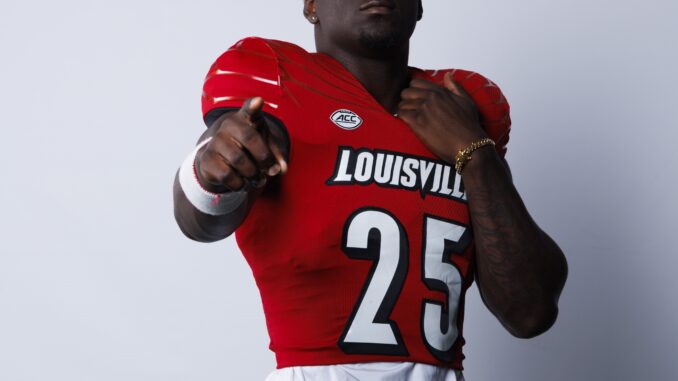
ESPN Breaking News: NCAA Issues Fine and Public Reprimand for Comments by Louisville Cardinals Running Back Isaac Brown
In a significant development within college athletics, the NCAA has announced disciplinary measures against Louisville Cardinals running back Isaac Brown following controversial comments he made recently. The sanctions include a monetary fine and a public reprimand, highlighting the NCAA’s ongoing efforts to uphold standards of conduct among student-athletes and maintain the integrity of college sports.
### Background of the Incident
The controversy erupted after Isaac Brown, a key player for the Louisville Cardinals, made remarks during a post-game interview that drew widespread attention and criticism. While the specific content of Brown’s comments was not initially disclosed, sources indicate that they contained language and sentiments deemed inappropriate and in violation of NCAA conduct policies.
The incident underscores the increasing scrutiny of athlete behavior in the era of social media and instant communication. Athletes are often under intense public and media scrutiny, and their words can have far-reaching implications for their teams, institutions, and personal reputations.
### NCAA’s Response and Disciplinary Actions
The NCAA’s disciplinary committee swiftly responded to the incident, conducting an investigation and ultimately deciding on a course of action aimed at reinforcing standards of sportsmanship and professionalism. The sanctions imposed on Isaac Brown are as follows:
– **Financial Fine:** Brown has been fined an undisclosed amount, intended to serve as both a punitive and educational measure. The fine signals the NCAA’s stance that inappropriate comments, regardless of intent, are unacceptable within collegiate athletics.
– **Public Reprimand:** Additionally, Brown received a formal reprimand, a public acknowledgment of his conduct and a reminder of the responsibilities that come with being a student-athlete. The reprimand serves as a warning to other athletes about the importance of maintaining decorum, especially in public forums.
### Context and NCAA Policy
The NCAA’s code of conduct emphasizes respect, integrity, and responsible behavior among student-athletes. Comments that are disrespectful, offensive, or violate principles of sportsmanship are subject to disciplinary action. The NCAA’s decision aligns with its broader efforts to promote positive role models in college sports and prevent behavior that could tarnish the reputation of collegiate athletics.
In recent years, the NCAA has increased its focus on athlete conduct, emphasizing education and preventative measures. Sanctions like fines and reprimands are common tools used to deter misconduct and encourage accountability.
### Reactions from the Louisville Community and Stakeholders
The Louisville community, including university officials, coaches, and fans, has reacted to the NCAA’s announcement with a mixture of support and concern. Many supporters believe that the disciplinary measures are appropriate, emphasizing the importance of maintaining a respectful and professional environment in college sports.
Louisville’s athletic director issued a statement emphasizing the university’s commitment to fostering a culture of integrity. “We support the NCAA’s efforts to uphold the standards of conduct expected of our athletes. Isaac Brown is a valuable member of our team, and we trust he will learn from this experience,” the statement read.
Some fans and commentators have argued that the sanctions serve as a reminder to all athletes about the importance of mindful communication, especially given the high-profile nature of college athletics today. Others have called for more context regarding Brown’s comments before passing judgment.
### Isaac Brown’s Response and Future Implications
Isaac Brown issued a public apology following the NCAA’s announcement, expressing regret for his comments and reaffirming his commitment to representing Louisville positively. “I realize that my words can have an impact beyond the game. I apologize to my teammates, coaches, and fans. I will be more mindful moving forward,” Brown stated.
This incident may serve as a pivotal moment in Brown’s athletic career, emphasizing the importance of professionalism and responsible communication. It also acts as a cautionary tale for other student-athletes navigating the complexities of public discourse in the digital age.
Looking ahead, the NCAA’s disciplinary action may influence how Louisville and other programs educate their athletes about media interactions and social media conduct. Many programs are increasingly implementing workshops and guidelines to help athletes understand the potential repercussions of their words.
### Broader Implications for College Sports
This case highlights ongoing challenges faced by college athletics regarding athlete conduct and the NCAA’s role in enforcing standards. As social media continues to amplify athletes’ voices, incidents like these are likely to become more common, prompting the NCAA and institutions to refine their policies and educational efforts.
Furthermore, the incident raises questions about the balance between athlete freedom of expression and the need for respectful conduct within the collegiate sports environment. While athletes should have the right to express themselves, they must also recognize their influence and the potential impact of their words.
### Conclusion
The NCAA’s fine and public reprimand of Louisville Cardinals running back Isaac Brown mark a reaffirmation of the organization’s commitment to maintaining integrity and professionalism among college athletes. As the landscape of college sports evolves, such disciplinary actions serve as important reminders of the standards expected from student-athletes both on and off the field.
Brown’s response, coupled with the NCAA’s measures, underscores the importance of accountability and responsible communication in shaping the future of collegiate athletics. Moving forward, programs across the nation may take this incident as an opportunity to reinforce educational initiatives, ensuring athletes understand the weight of their words in the digital age.
Leave a Reply